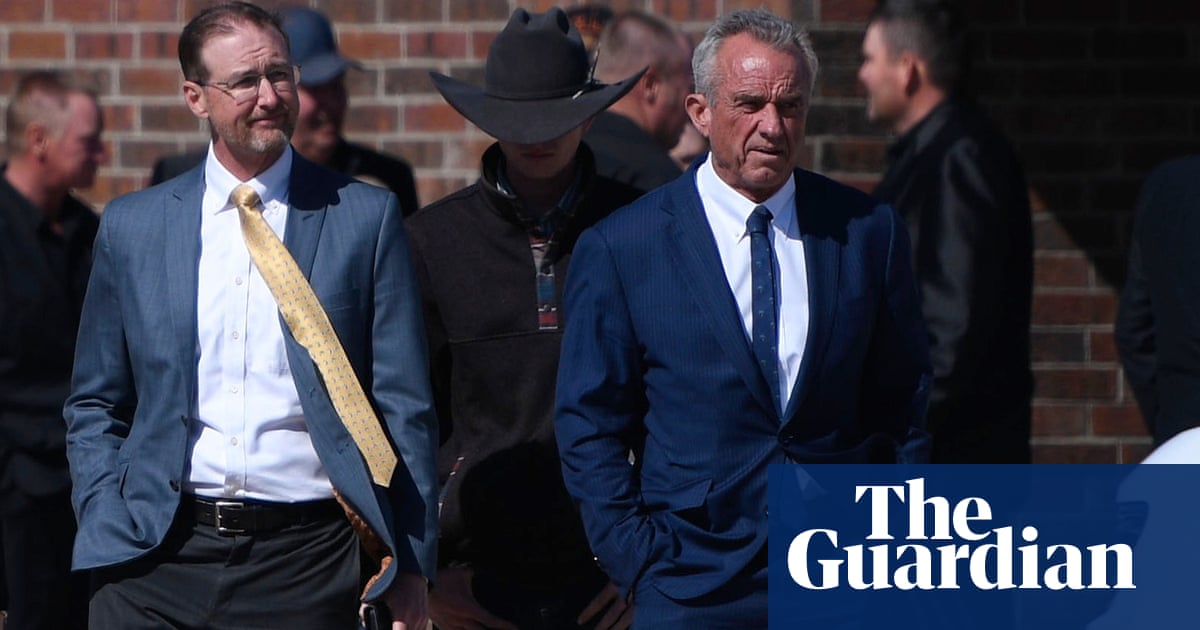Facebook and Twitter resist calls to ban anti-vaxx campaigner
Twitter and Facebook have ignored calls to ban Robert F Kennedy Jr from their platforms despite concerns over his latest documentary which critics say appears aimed at discouraging black Americans from getting vaccinated against Covid-19.
Disinformation experts want the social media platforms to follow Instagram’s lead and take tougher action against Kennedy, the son of the late Robert F Kennedy and one of the most prominent anti-vaccine campaigners in the US, for being a persistent spreader of false or misleading health claims.
His new film Medical Racism, released last week, has exacerbated concerns that anti-vaccination campaigners are deliberately targeting ethnic minority communities, often playing on historic mistreatment to fuel distrust in health authorities.
As well as focusing on historic scandals such as the 1932 Tuskegee study, in which black men were deliberately exposed to syphilis, the film features a mix of well-known black anti-vaxxers alongside ordinary people questioning the safety of coronavirus vaccines.
The failure to ban Kennedy, who produced the film and narrates its introduction and conclusion, is indicative of a broader failure to stop anti-vaccine propaganda from spreading, the experts said.
Renee DiResta, the technical research manager at the Stanford Internet Observatory, said: “There is something to be said for taking pre-emptive action against repeat spreaders — people who are consistently out there spreading misinformation.”
She pointed to the decision by Instagram, which is owned by Facebook, to remove Kennedy and added: “Should both platforms take the same action, even if his posts each are different? I would argue yes.”
Mark Warner, the Democratic chairman of the Senate intelligence committee, said: “Continued sources of harmful misinformation — like health misinformation — should be banned from platforms whose scale ensures their harmful misinformation reaches a significant audience.”
Erica DeWald, a director at the pro-vaccine group Vaccinate Your Family, said: “I am shocked that he is still on Facebook and Twitter. He is a main purveyor of misinformation. How they haven’t removed him is beyond me.”
Facebook said it had removed Kennedy’s film, but not his Facebook page, as it had not violated the platform’s terms and conditions. Twitter said: “The account you referenced is not currently in violation of the Twitter rules. Twitter will not take enforcement action on every instance of misinformation and we’re prioritising clear cases where material could contribute to offline harm.”
Kennedy said his film “does not advise anyone to avoid vaccines”, adding that it “exposes regulatory corruption and institutional racism . . . and empowers all Americans to demand the safest vaccines”.
Pro-vaccine campaigners say attempts to target black Americans, given they are one of the groups most likely to express concerns about taking a coronavirus vaccine — in part because of historical mistrust of the US medical establishment — is a worry.
Imran Ahmed, chief executive of the Center for Countering Digital Hate, said: “In the US, if you’re going to market [anti-vaccine content], you have to understand race is part of it.”
He pointed out that Kennedy has also been translating his anti-vaccine messaging into Spanish to spread among Hispanic social media users. He has also been working with Nation of Islam organiser Tony Muhammad, who helped to produce his latest film.
Ahmed added: “You take the worst, most engaging and controversial content and put it into people’s timelines. [The algorithm] is serving that stuff up without any thought of the public good.”
With coronavirus vaccines being rolled out across much of the world, social media companies have come under heavy political and social pressure to stop the spread of false claims about their safety.
Senior officials in the Biden administration have been in touch with both Facebook and Twitter to urge the social media groups to stop anti-vaccine content going viral. “Some platforms have done better than others,” said DeWald. “It has been a mixed bag.”
A report by the Center for Countering Digital Hate in July last year found social media accounts held by so-called anti-vaxxers have increased their following by at least 7·8m people since 2019.
In December Facebook vowed to remove false claims about vaccines that had been “debunked by public health experts”, having earlier started removing claims about Covid-19 which could “contribute to imminent physical harm”.
It then broadened this policy to include general claims about vaccines, including that they are ineffective, toxic or cause autism, and said that its focus would be repeat offender groups, pages and accounts.
But the platform is still host to accounts for several anti-vaccination influencers, including Kennedy, who has 300,000 followers, but also Joseph Mercola, an alternative medicine entrepreneur who has 1.5m followers, and the film producer Del Bigtree, who has 118,000 followers.
Andy Slavitt, a senior adviser to US president Joe Biden, warned last week that Russia was deliberately promoting online anti-vaccine content on Facebook, especially by using images of large needles. However, disinformation experts say homegrown groups such as Kennedy’s Children’s Health Defense are a more significant driver of the spread.
Dorit Reiss, a professor at University of California Hastings College of the Law, said: “The anti-vaccine movement is kind of like a pyramid scheme. A few well-funded people at the top create the disinformation content, then a network of social media influencers share it, and then there are lots of local groups that pick it up.”
Coronavirus business update

How is coronavirus taking its toll on markets, business, and our everyday lives and workplaces? Stay briefed with our coronavirus newsletter.


